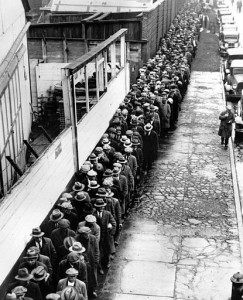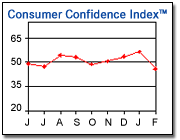The unemployment crisis in the United States continued unabated in February 2010, as new statistics compiled by the Department of Labor show that unemployment rose in over half of the states in America last month:
March 26 (Bloomberg) — Unemployment increased in 27 U.S. states in February and dropped in seven, a sign the labor market needs to pick up across more regions to spur consumer spending and sustain the economic recovery.
Mississippi showed the biggest jump in joblessness with a 0.4 percentage point rise to 11.4 percent, according to figures issued today by the Labor Department in Washington. Nationally, unemployment held at 9.7 percent in February for a second month and employers cut fewer jobs than anticipated, figures from the Labor Department showed on March 5.
Today’s report indicates broad-based hiring is yet to develop following the loss of 8.4 million jobs since the recession began in December 2007. Florida, Nevada, Georgia, and North Carolina set record levels of joblessness last month.
“Until we see improvement in employment in a fair number of U.S. states, it’s not going to do a heck of a lot for the recovery,” said Jennifer Lee, senior economist at BMO Capital Markets in Toronto. “The worst seems to be over, but there’s a huge amount of work to be done to create jobs. It’s going to be a long, winding road.”
Payrolls dropped in 27 states, led by Virginia. The state’s loss of 32,600 jobs last month, the largest in records going back to 1983, was also the biggest decline among states. California, Michigan, Pennsylvania, Maryland and Texas also reported large decreases in employment, the report said.
These results, over a year into the Obama Administration’s reign and its vaunted Stimulus plan, provide yet another piece of evidence that the Obama economic program is failing to turn this country’s economy around. After all, the Obama Administration did predict that the passage of its Stimulus legislation would result in a steady decline in unemployment from the Summer of 2009 onward – a prediction that is proven false by every unemployment release since then. Indeed, the newly announced Obama initiative to order banks to reduce or waive monthly mortgage payments due from the unemployed will only exasperate the ongoing unemployment crisis, creating another incentive for the individual to become or remain unemployed so as to qualify for the new federal mortgage payment reduction/waiver program.


